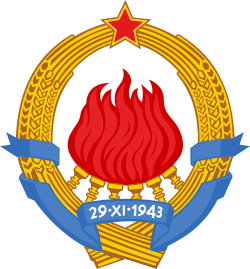Kingdom of Serbs, Croats and Slovenes parliamentary election, 1927
|
| |||||||||||||||||||||||||||||||||||||
| |||||||||||||||||||||||||||||||||||||
All 315 seats to the National Assembly 158 seats were needed for a majority | |||||||||||||||||||||||||||||||||||||
|---|---|---|---|---|---|---|---|---|---|---|---|---|---|---|---|---|---|---|---|---|---|---|---|---|---|---|---|---|---|---|---|---|---|---|---|---|---|
| Turnout | 69.0% | ||||||||||||||||||||||||||||||||||||
| |||||||||||||||||||||||||||||||||||||
| |||||||||||||||||||||||||||||||||||||
 |
|---|
| This article is part of a series on the politics and government of Yugoslavia |
| Administrative divisions |
|
Foreign relations |
Parliamentary elections were held in the Kingdom of Serbs, Croats and Slovenes on 11 September 1927.[1] The People's Radical Party remained the largest faction in Parliament, winning 112 of the 315 seats.[1] As it turned out, they were the last relatively free elections ever held in the 1918-1992 incarnation of Yugoslavia.
Results
| Party | Votes | % | Seats | +/– |
|---|---|---|---|---|
| People's Radical Party | 742,111 | 31.9 | 112 | +1 |
| Democratic Party | 381,784 | 16.4 | 59 | +23 |
| Croatian Peasant Party | 367,570 | 15.8 | 61 | –6 |
| Independent Democratic Party | 199,040 | 8.6 | 22 | +14 |
| Agrarian Party | 136,076 | 5.9 | 9 | +5 |
| Slovene People's Party | 106,247 | 4.1 | 20 | 0 |
| Democratic Party–Yugoslav Muslim Organization | 73,703 | 3.2 | 11 | New |
| Yugoslav Muslim Organization | 58,623 | 2.5 | 9 | –6 |
| German Party | 49,849 | 2.2 | 6 | +1 |
| Croatian Bloc | 45,218 | 2.0 | 2 | New |
| Republican Union of Workers and Peasants[2] | 43,114 | 1.9 | 0 | 0 |
| Croatian Popular Party | 31,746 | 1.3 | 1 | +1 |
| Socialist Party of Yugoslavia | 24,035 | 1.1 | 1 | +1 |
| Independent Agrarian Party | 9,900 | 0.5 | 1 | 0 |
| Republican Party | 6,122 | 0.3 | 0 | 0 |
| Montenegrin Federalist Party | 5,153 | 0.2 | 1 | –2 |
| Romanian Party | 4,654 | 0.2 | 0 | New |
| Serbian Party | 2,142 | 0.1 | 0 | 0 |
| Bunjevac-Šokac Party | 1,618 | 0.1 | 0 | 0 |
| Croatian Community | 1,103 | 0.1 | 0 | New |
| Others | 34,862 | 1.6 | 0 | – |
| Total | 2,324,676 | 100 | 315 | 0 |
| Registered voters/turnout | 3,375,593 | 69.0 | – | – |
| Source: Nohlen et al. | ||||
Elected representatives
.jpg)
New members of parliament after swearing Oath.
- S. Barić - Croatian Popular Party[3]
- Đuro Basariček - Croatian Peasant Party
- Sekula Drljević - Montenegrin Federalist Party
- Anton Korošec - Slovene People's Party
- Filip Markotić - Croatian Peasant Party[4]
- Ante Pavelić - Croatian Bloc[5]
- Ivan Pernar - Croatian Peasant Party
- Puniša Račić - People's Radical Party
- Stjepan Radić - Croatian Peasant Party
- Milan Stojadinović - People's Radical Party
- Ante Trumbić - Croatian Bloc[5]
Ethnic breakdown
The members of parliament had the following ethnic makeup:
| Party | Serbs | Croats | Slovenes | Bunjevci | Undeclared | Germans | Hungarians | Albanians | Turks | Total |
|---|---|---|---|---|---|---|---|---|---|---|
| People's Radical Party | 102 | 2 | - | 2 | - | - | 2 | 3 | 1 | 112 |
| Croatian Peasant Party | 2 | 59 | 2 | - | - | - | - | - | - | 63 |
| Democratic Party | 56 | 2 | - | - | - | - | 1 | 1 | 1 | 61 |
| Independent Democratic Party | 13 | 5 | 4 | - | - | - | - | - | - | 22 |
| Yugoslav People's Party | - | 1 | 20 | - | - | - | - | - | - | 21 |
| Agrarian Union | 9 | - | - | - | - | - | - | - | - | 9 |
| Yugoslav Muslim Organization | 1 | 11 | - | - | 6 | - | - | - | - | 18 |
| German Party | - | - | - | - | - | 6 | - | - | - | 6 |
| Small groups | - | 2 | 1 | - | - | - | - | - | - | 3 |
| Total | 183 | 82 | 27 | 2 | 6 | 6 | 3 | 4 | 2 | 313 |
References
- 1 2 Dieter Nohlen, Dolf Sternberger, Bernhard Vogel, Klaus Landfried (1969) Die Wahl der Parlamente und andere Staatsorgane, Walter de Gruyter, p. 784
- ↑ “Hronologija radničkog pokreta i SKJ 1919-1979”, “Narodna knjiga” и “Institut za savremenu istoriju”, Beograd, 1980, T. 1, p. 162.
- ↑ Croatian Populist Party
- ↑ Leček, Suzana; Brodski odvjetnik Filip Markotić – ‘desni’ haesesovac?.
- 1 2 Ante Pavelić Archived 2011-06-16 at the Wayback Machine.
- ↑ John R. Lampe, Yugoslavia as History: Twice There was a Country. Cambridge University Press, 2000. (p. 159)
External links
This article is issued from
Wikipedia.
The text is licensed under Creative Commons - Attribution - Sharealike.
Additional terms may apply for the media files.

